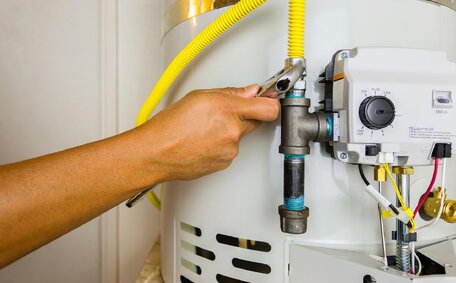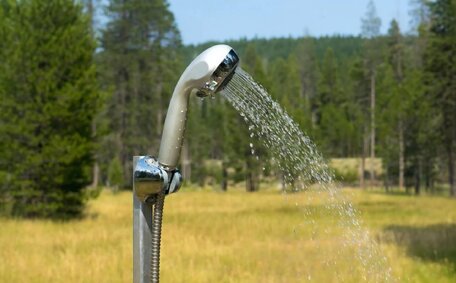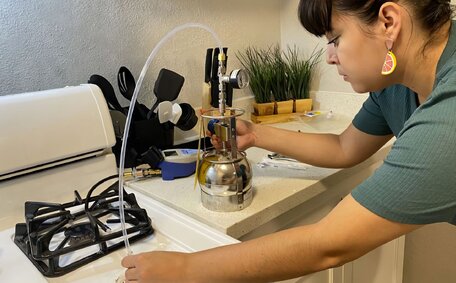Recognizing the signs of a plumbing emergency
Some common signs of emergency plumbing situations requiring immediate action include burst pipes, blocked drains, gas leaks, lack of hot water, flooding from leaks, sewage backups, and toilet malfunctions. In a sewage backup scenario, it’s crucial to shut off the water supply to your toilet, know how to proceed and contact a professional plumber for assistance, while following safety protocols.
These plumbing problems, if neglected, can cause significant damage to your home, health, and impair both home and business functionality.
Water leaks can be deceptive, appearing minor but allowing water to accumulate and escalate into serious issues over time. Be vigilant for any plumbing-related signs, as damp walls or floors, unusually high water bills, and loud pipe noises could indicate more severe underlying issues. It’s crucial to address any water leak promptly, as even a small leak can escalate to emergencies leading to flooding, mould growth, and infrastructure deterioration.
Developing a plumbing emergency response plan is essential for prompt and effective action during crises. Prioritise the safety of your family before protecting your property.
Familiarise yourself with gas leak procedures such as shutting off the water supply, identifying shutoff valves, and keeping emergency contacts accessible. Summoning professional help swiftly at the first sign of trouble can play a crucial role to minimise damage during your emergency plumbing crisis near gas fixtures.
Taking safety precautions
During a plumbing emergency, a professional plumber prioritises safety above all else before addressing the issue. If there’s flooding, immediately call for assistance then shut off water supply to the affected areas as well as power at the breaker panel.
Evaluate hazards such as the risk of electric shock, fire, slipping, and chemical exposure. Clear the vicinity and cordon off the affected area in your establishment, which are critical steps to take towards safety.
If you detect a gas smell or hear hissing, especially near your hot water system, recognise the potential danger and act quickly. Evacuate everyone from the building and turn off your gas supply, leaving doors open. Don’t use phones, turn on/off lights, or operate electrical equipment.
Proceed to turn off main water and call an emergency plumber or services once you’re at a safe distance from the leak, as sparks may ignite gas emissions.
Secure the safety and proper ventilation for your family, employees, and pets, and shut off your home’s main exterior water and gas supply immediately if accessible. If gas odours persist despite shutoffs, continue ventilating and await professional assistance before re-entry.
Keeping emergency numbers handy for plumbers, fire departments, utility companies, and poison control assists rapid response to any plumbing issue. Initially, ensure there are no imminent dangers from emergencies before deciding to call for help during business hours if the situation permits.
Turning off water and gas supplies
Locate your main water valve to promptly shut it off in the event of a burst pipe. Use a crescent wrench to turn the valve clockwise until it’s at a right angle to the pipe, halting water flow to your property.
Learn how to shut off the gas supply by familiarising with the valve on your property’s boundary. Use an adjustable wrench to carefully rotate it crosswise to the pipe to turn off gas supply. Tightening it may require extra effort, but avoid excessive force or you may damage the valve.
Upon encountering immediate risks like flooding or strong gas smells, evacuate at once, disconnect utilities, and call an emergency plumber when safe. Call emergency services from outside following safety precautions already outlined. After you call an emergency plumber and while waiting for their arrival, your next prudent step may be shutting off water and gas to contain the damage.
Ensure your plumbing system and appliances are comprehensively switched off before restoring utility supplies after receiving the all-clear. Turn on taps slowly and check pipes and fixtures for further issues before resuming normal usage. Our 24/7 emergency plumbers can conduct inspections post-shutdown to prevent additional damage.
Assessing and documenting damage
Once immediate safety hazards are addressed, meticulously inspect your property to assess and record damage for insurance purposes. Check ceilings, walls, floors, foundations, and belongings for water, fire, structural issues, or chemical contamination to understand what you can do before professional help arrives.
Capture dated photographs of the damage and maintain a detailed inventory of impacted items and property areas. Details like water stain measurements assist claims assessments. Scan or photocopy receipts and ownership documents if possessions are damaged beyond repair.
Record details like serial numbers for appliances like hot water systems in case they require replacement. Log instances of previous damage in the same areas to show insurers a potential existing fault wasn’t the cause.
Safely storing damaged documents and records assists the claims process. Be available on-site as assessors inspect and compile a damage report. Providing evidence upfront substantiates your claim and helps secure optimal reimbursements for remediation and repairs.
Implementing temporary DIY solutions
The first step to mitigate the severity of the situation includes initiating appropriate measures that will cushion the effect of necessary temporary repairs until emergency plumbers arrive.
As a provisional measure, wrap tape firmly around leaky hoses or pipe joints.
Deploy your plumbing kit essentials, such as buckets, pans, or towels beneath leaks or a clogged drain to catch water until fully halted. Check their capacity often to empty collected water and mitigate overflow flooding potential. Consider propping up protective barriers around suspected leak sites if safely accessible.
Here’s some practical advice: shutting off individual appliance water lines behind washing machines or under sinks containing isolated leaks are achievable steps you can undertake yourself. If your hot water is compromised but the system is partially operational, refer to your water heater’s manual for temperature control adjustments to save cold water.
Although these temporary fixes may offer interim relief, it is vital to consult qualified plumbers for immediate repair of urgent plumbing issues. Never attempt plumbing or electrical repairs yourself, particularly near gas lines; what should I do I mean, plumbing professionals recommend? Avoid DIY near standing water or leaking gas lines.
Calling a professional emergency plumber
When challenges arise, it’s critical to contact your local plumber, such as the professionals at Blakehurst Plumbing, who we highly recommend and who offer responses in emergency situations like gas leaks, burst pipes causing flooding, complete drain blockages, sewer malfunctions, or a lack of hot water supply. Contact qualified technicians immediately by calling Blakehurst Plumbing’s 24/7 emergency line at 1300 349 338 or emailing [email protected].
Enlisting professional plumbing services for your plumbing issues without delay helps avoid further damage, restore functionality quicker, and fend off complications like mould or interruptions to your home business. Even for small plumbing issues, expert plumbers have the tools, skills and experience to provide reliable solutions where DIY fixes may only serve as temporary measures.
Licenced technicians quickly assess your unique situation on-site and implement appropriate emergency response protocols to protect safety. Leveraging professional knowledge prevents inaccurate troubleshooting and permanent equipment damage like appliance short circuits. It also reduces the personal health hazards of handling toxic drainage backflows or hazardous spills.
Let emergency professionals tackle the pressures of crisis response and complicated repairs. Focusing their efforts on swift, lasting solutions minimises stress while optimising your property’s protection. Gaining peace of mind that expert emergency plumbers are resolving plumbing catastrophes promptly allows you to direct attention where it’s needed most.
Preventing future plumbing emergencies
Conducting routine checks and securing yearly inspections by licensed plumbers safeguards your pipes against unforeseen emergencies. Consistently remove trees and encroaching roots from your sewer and main water lines to avert costly clogs and pipe ruptures.
Inspect your unit’s pipes, fixtures, appliances including water heaters, and drainage systems periodically for leaks, cracks, or other wear. Addressing minor leaks promptly can save you from actions that cause water damage and mould risks as time progresses. Loose fixtures should get resealed to avoid detachments that can lead to flooding.
Schedule annual gas line and fitting inspections by professionals to detect and fix minor leaks before they escalate into hazards. Request camera inspections on main sewer lines to clear tree root infiltrations or pinpoint pipe faults needing repair.
Installing overflow guards, drain shields, leak detectors, and water shutoff valves enhances prevention in vulnerable spots. Strategically placing safeguards limits the extent of flooding and rapid response activation if catastrophes do occur.
Having an emergency preparedness plan
A well-devised plan, featuring your plumber’s emergency contact information, ensures you can react promptly during plumbing emergencies. Keep your trusted plumber’s contact details on speed dial, ready to call plumber for skilled assistance rapidly when required.
Learn to shut off water lines and gas valves quickly to immediately contain sources of damage. Label cut-offs clearly and ensure household members are educated on usage procedures. Place plumber’s tools like wrenches, plungers, buckets and towels in an easily accessible crisis response kit to tackle minor issues while awaiting pros.
Map your property’s plumbing system and plumbing fixtures annually, noting pipe locations, water heater age and warranty, and recent repairs. Diagnosing faults swiftly depends on comprehension of your infrastructure. Conduct inspections regularly too, staying vigilant about leaks or deterioration requiring prompt attention to avoid major failures.
Fit your system with preventive accessories like overflow valves, leak sensors, or drain guards to ward off potential disruptions. Combining sensible safeguards with emergency readiness steps maximises your resilience when plumbing disasters strike.
Restoring property after water damage
For water damage restoration in a property, act quickly to thoroughly dry the space, preventing issues like mould or structural decay. If flood damage is minor, our experienced team recommends deploying dehumidifiers, fans, and open windows to promote air circulation. Soak up standing water with towels and remove damp materials.
In severe cases of widespread flooding, enlist professional water damage restoration services for comprehensive drying, sanitization, and repairs. Technicians use truck-mounted drying equipment and antimicrobial treatments to fully restore interiors and structures.
Thorough drying of floors, walls, and other waterlogged areas is essential to prevent future mould growth beneath surfaces. Areas that seem dry may retain moisture, particularly concerning in commercial plumbing, so use moisture meters to detect any concealed dampness.
Document the restoration process thoroughly. Technicians test pH levels to ensure sanitization neutralises contaminants from floodwaters. Keep the property well-ventilated over subsequent weeks and schedule follow-ups to confirm spaces remain moisture-free before rebuilding damaged zones.






